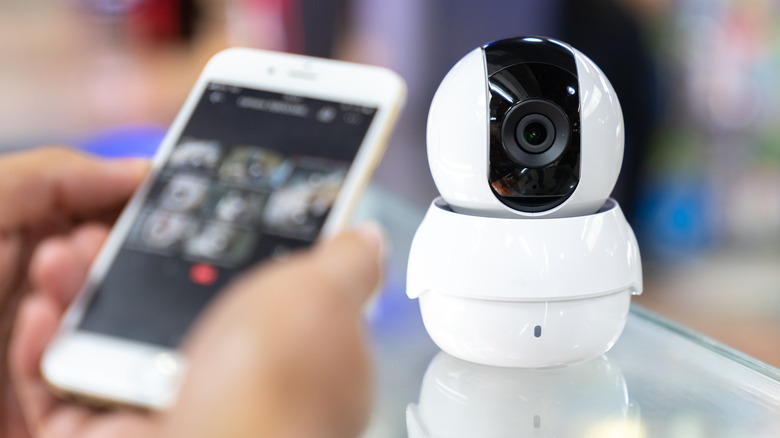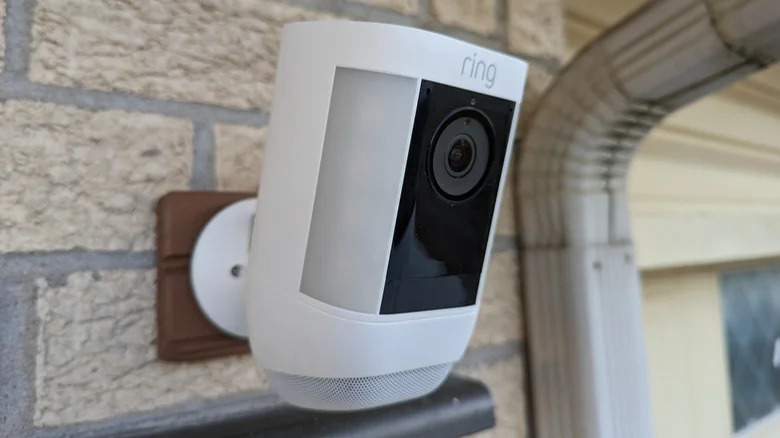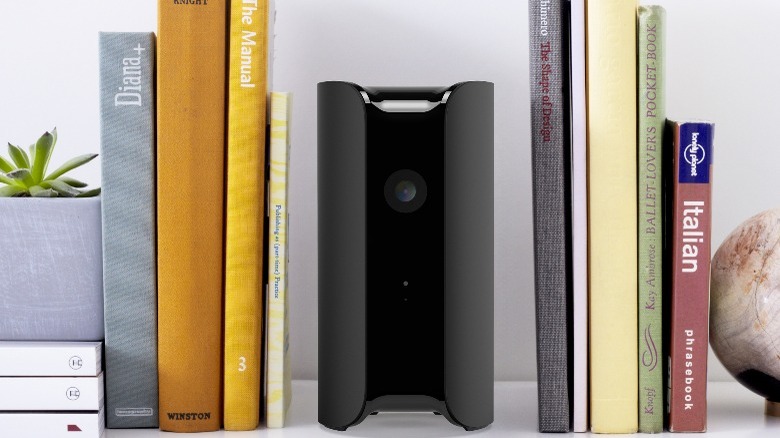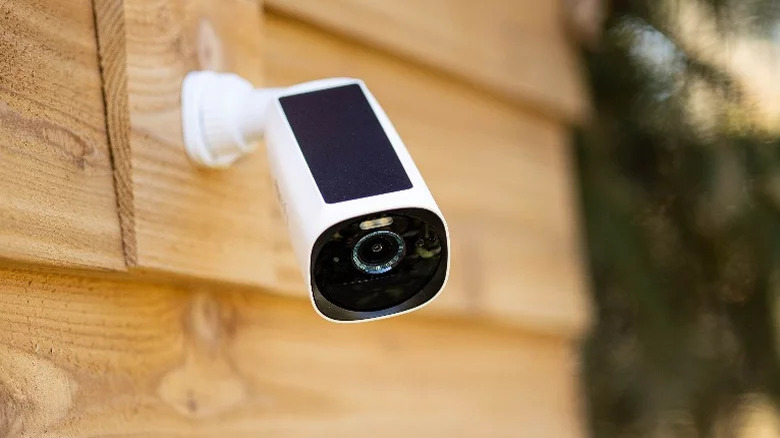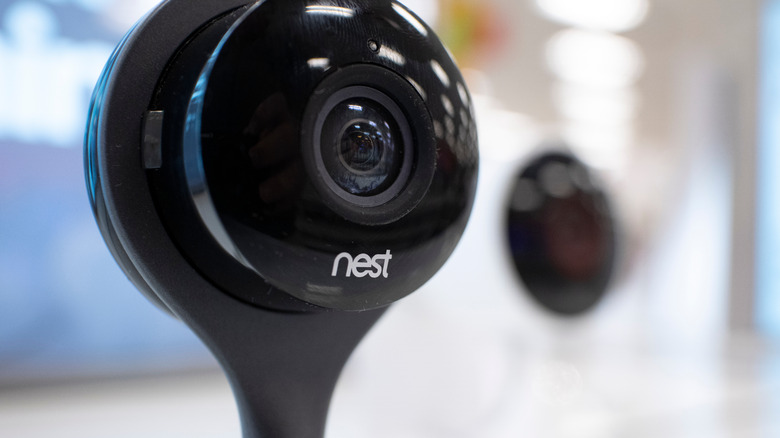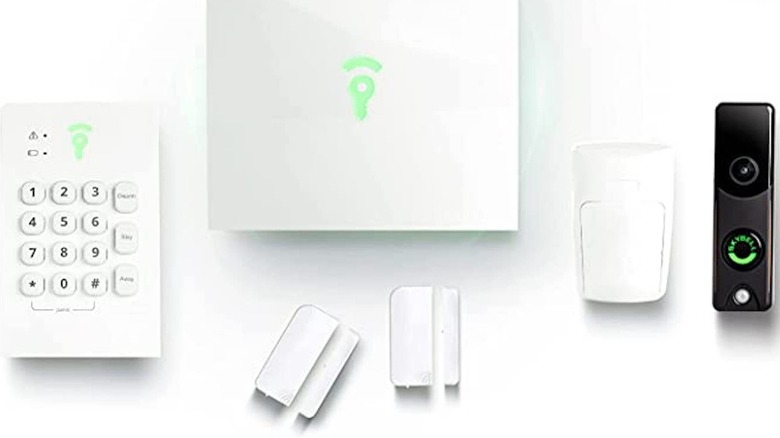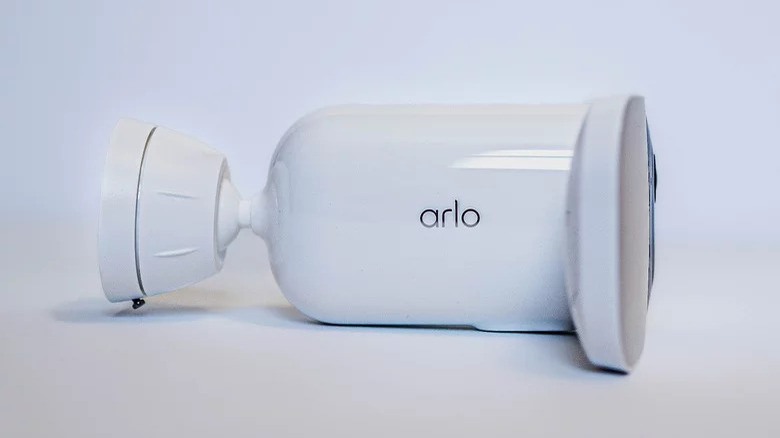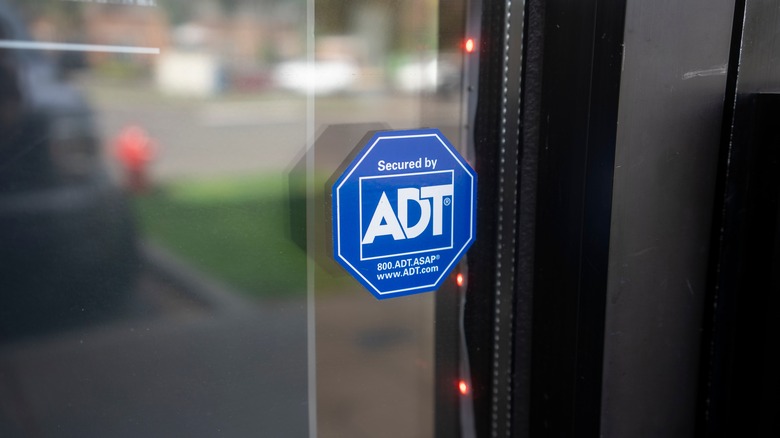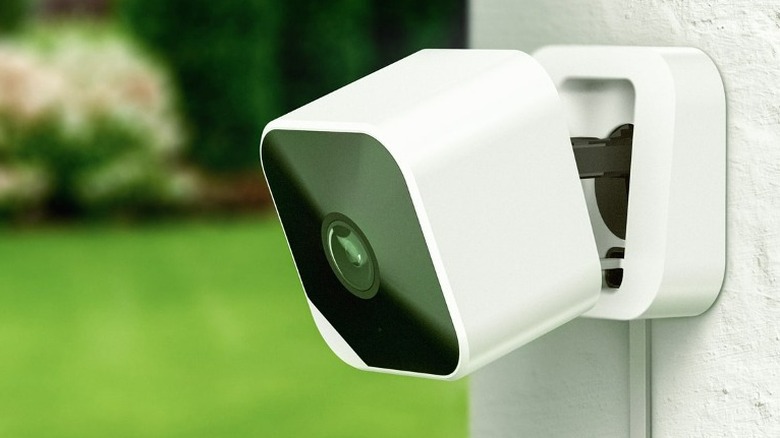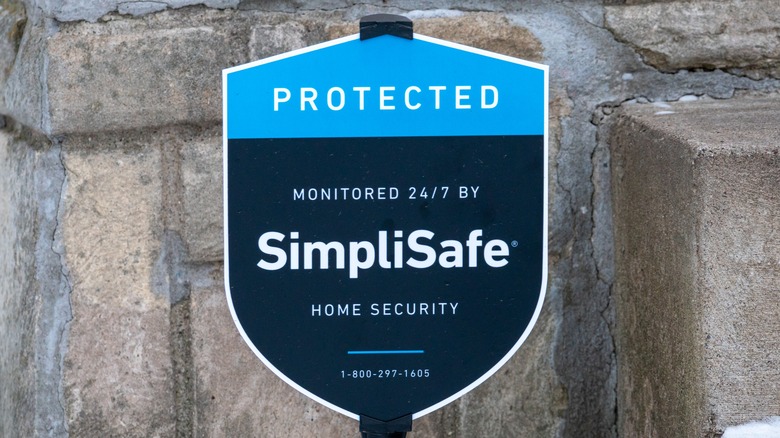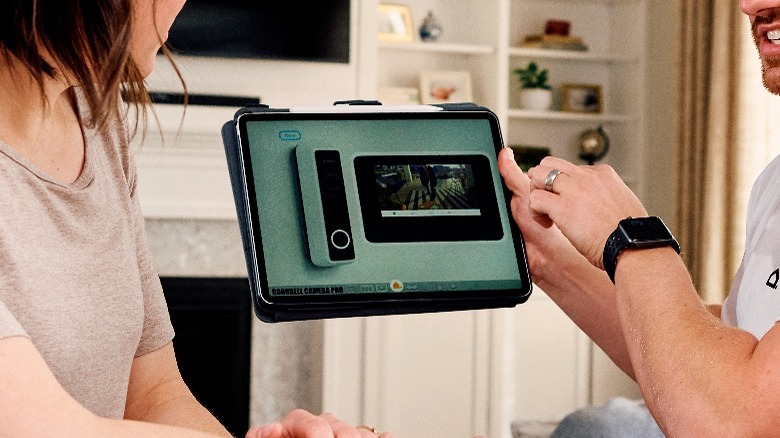Major Home Security Brands Ranked Worst To Best
We may receive a commission on purchases made from links.
Implementing a security system means putting the safety of your family and home into someone else's hands, so picking a system isn't a decision to take lightly. Selecting the brand to trust isn't a matter of drawing names out of a hat, either — some home security names have been around for years but are more expensive, while others may be more affordable and yet have a less established brand legacy.
There are two general approaches to home security to choose from, too. You can opt for a full-service security company that will visit your home to install the system and can usually provide ongoing services, such as calling 911 when an alert is triggered. However, there are tons of home surveillance and security brands out there that encourage DIY camera installation and homeowner oversight, like the popular Ring camera.
With that in mind, we've put together a ranking of several popular home security brands, listed from worst to best. All of the factors we have taken into account boil down to how safe a system will make you and your family feel. While there are surely very few home security brands out there that are bad — or, to be more accurately described, incompetent or untrustworthy — some will be a better fit for you than others.
10. Ring
If asked to list three home security brands, Ring would probably be one of the first names rattled off by most people. While you could argue that the omnipresence of this brand makes it a safe choice because of presumed higher standards of customer service, product quality, accountability, and security, Ring's reputation is far from perfect.
To being with, there's Ring's complicated relationship with law enforcement. In an earlier era of the brand, Ring was known to hand over video footage to police and investigators without being presented with a warrant. The home security brand eventually put a stop to law enforcement directly contacting Ring users through the app for assistance with active investigations, but consumer distrust hasn't disappeared overnight.
Ring's parent company can't be forgotten, either. Being owned by Amazon means being associated with the history of distrust that customers have with that tech and retail giant. Ring also recently announced that customers are now expected to pay for basic features that were, until March 2023, free, such as the Home and Away modes on the Ring app. Regardless of camera quality or performance – which, for what it's worth, isn't terrible — both Ring and Amazon's dedication to the safety of its customers has been called into question too many times.
9. Canary
Note: A previous version of this article claimed that Canary's products don't have features like smoke or carbon monoxide detection, but we've corrected this by including references to Canary Pro's environmental monitoring capabilities.
Canary's humble beginnings as a successful Indiegogo campaign make it one of the smaller home security names in the mix.
This brand offers a core suite of home security features, including Alexa and Google Home compatibility, a night vision camera, and motion detection. Canary devices don't store as much video footage as Ring does — Ring can store 60 days, Canary only 30. This bare-bones approach is what places Canary lower on our list since the brand may be less capable of keeping your home secure as a result, but it is still a basic, simple home security approach for renters or beginners.
On the plus side, the Canary Pro unit offers HomeHealth Technology, a feature that allows owners to monitor the environment's humidity, temperature, and air quality (including smoke and carbon monoxide detection). Unfortunately, an annoying number of Canary's features are stuck behind a paywall, but you can still use the system in a very basic way if you can't swing the monthly fee. However, one strength unique to Canary is that your system can arm or disarm the house based on a face detected by the system's AI person recognition technology.
8. Eufy
Eufy home security products have undergone extensive SlashGear testing. In general, we've approved of Eufy's home surveillance collection in terms of how well the cameras work. A huge perk to this brand is its rejection of expensive subscriptions, which competitors require for features like cloud-based video storage, human face recognition, and others. Eufy products are high-quality cameras, well-built, and capable of withstanding several home security challenges like lack of solar exposure and cold environmental temperatures.
However, in keeping the perceived safety and security of the homeowner in mind, the hot water that Eufy landed in late 2022 can't go unacknowledged. Despite the brand's claim that users' sensitive home security data — namely pictures and video — were only being stored locally within the users' Eufy ecosystem, a security watchdog reportedly discovered vulnerabilities in the local server storage for Eufy security cameras.
That said, the claims weren't found to be concrete — independent analysts weren't able to replicate the findings, although they lamented that the claim was plausible and credible — and were countered by Eufy. Unfortunately, the brand's defense against the claim and apology didn't sit right with some users, and since then faith in Eufy has been a bit slow to recover.
7. Nest
Nest is the home security sector of Google. Like Ring, Nest devices are popular home fixtures for their affordability and their brand familiarity. However, Google — despite being a tech giant with an imperfect data security reputation just like Amazon — has managed to avoid controversy and establish consumer confidence in Nest better than Amazon has with Ring.
Google Nest couldn't climb higher on this list than its current ranking because none of its security cameras offer higher-resolution video than 1080p. This could prove problematic when trying to identify the face of a trespasser, make out a license place, or otherwise analyze a security event. Still, SlashGear testing of Google Nest products has been largely positive over the years, and Nest doesn't require a subscription for a modest amount of cloud video storage, something that very few brands in the home security mix offer.
Google Nest cameras are easy to install, even easier to control and use, and great for smart home beginners or renters. The motion detection and facial recognition technology in Nest cameras have always worked remarkably well in our firsthand use, too.
6. Frontpoint
Frontpoint is a home security system that you may not have heard of yet. That could be because Frontpoint is among the more expensive DIY options out there, although it is just as capable as its competitors. Most of Frontpoint's $49.99 per month baseline cost is explained by its mandatory professional 24/7 monitoring — you can't opt for self-surveillance of your system instead. The peace of mind that this affords is compelling, though.
With Frontpoint, homes can be secured from corner to corner. There are key fobs to arm and disarm the system, motion detectors, indoor and outdoor cameras, a video doorbell, and more. One pro for Frontpoint is that its wide product array means a system from this brand can be scaled up to the same level as systems from professional installers like ADT and Vivint. However, Frontpoint's DIY approach means that you can nix the fee of a professional install and DIY the process instead.
5. Arlo
Arlo security cameras are a product that we see great benefit in for people with light to moderate home surveillance needs — think one camera on the driveway or backyard. In our firsthand testing of an Arlo camera, we found the live remote video feed to be low quality and difficult to connect to, despite the Arlo app indicating a solid network connection.
Arlo also requires a subscription for a vast majority of its camera features. While that may not be entirely unusual, it didn't sit well with us considering that features such as 4K video and distinction between types of movement like human, vehicle, and animal were advertised on the packaging in a way that suggested the features were included in the purchase.
In the end, Arlo's cost may make it an unsustainable system for people looking to implement multiple cameras or other security devices, while the unreliable live connection we experienced bumped it down by a few slots. However, Arlo cameras still perform exceptionally well in several environments, so give this brand consideration if you want just a camera or two.
4. ADT Home Security
Perhaps the most established home security brand on this ranking, ADT is an exceptional option if you want an extensive security system custom-tailored to your home with a white-glove professional installation and thorough smart home compatibility. The downside to ADT and similar companies that professionally install and monitor your home security system is that higher costs, monthly fees, and subscriptions aren't optional. Even as a nearly 150-year-old company, ADT has updated its products to include more appealing smart home features, like video doorbells. Of course, all this comes with one of the heftiest prices to pay in home security.
On the plus side, ADT isn't going to lose relevance in the home security field without a fight. The company partnered with Google in 2020 to integrate its Nest devices into ADT systems and even includes Nest products in its home security packages. This year, ADT announced a mobile application that will finally corral the control of its security systems into one place, rather than having the controls scattered across the web portal, app, and in-home panels.
3. Abode
Abode and Arlo are close competitors offering similar key features like self-monitoring and easy DIY installation of their products. Abode, however, expanded its product collection beyond cameras to include things like key fobs, entry sensors, and motion detectors for an added layer of home security. While Arlo's cameras do have motion detection built-in, as do most modern home surveillance cameras at this point, the Abode motion detectors are appealing for places where you don't necessarily want or need constant video surveillance but do want to be alerted to activity, like in a child's room.
Another advantage that Abode holds over Arlo is its cross-compatibility with other smart home names, notably Nest and Alexa, making integrating an Abode security system into a smart home easier. Arlo's cameras may outperform Abode's with their 4K video capabilities, but only if you're willing and able to pay. Further, Abode offers a more comprehensive safety blanket with additional features and security products. Abode takes the wide range of products offered by a top-tier full-service security company, like Vivint or ADT, and offers it in a more affordable translation — with a baseline video cloud storage feature for free, too.
2. SimpliSafe Home Security
SimpliSafe is an excellent home security system that provides a full span of protection at an obtainable price. We like that SimpliSafe doesn't require you to pay for a professional installation but offers 24/7 professional home monitoring at a reasonable subscription fee.
Knowing that security experts are at the ready to call the authorities or contact you if something is amiss at home allows for more peace of mind when you're away, especially in the late hours of the night or when you're unable to remotely monitor yourself, like when you're on vacation, on a plane, or on a cruise. What also makes SimpliSafe's professional monitoring very appealing is that there's no long-term contract necessary. This security brand lets you hire professional monitoring month to month, so if you're going away for the summer or want some extra eyes on your space during the holidays, you only have to pay for what you need and cancel it when you please.
In our experience, SimpliSafe equipment is reliable and capable. It covers the needs of most homeowners, which are mostly to pick up on human activity near doors and vehicles. However, SimpliSafe's products are geared towards tool-free installation and renters looking to DIY some security for their temporary homes. For that reason, professional install support isn't as strong at SimpliSafe as it is at full-service competitors, and the peel-and-stick adhesive on SimpliSafe equipment doesn't boast the same longevity as traditionally mounted cameras.
1. Vivint Home Security
Vivint Home Security is a full-service security provider that guides customers through selecting the best products for their home. Vivint and SimpliSafe run a close race against one another, as they're both newer home security names than ADT, offer similar product lineups, and have largely positive reputations for performance and security. Each of these brands carries key equipment for home surveillance, including motion and glass-breaking sensors. Vivint's baseline security system package has a few offerings that SimpliSafe's basic package doesn't, like a smart lock and a video doorbell.
Setting Vivint apart from SimpliSafe is its offer for professional installation of its systems. SimpliSafe may offer third-party installation for a fee in certain areas, but usually the installation is done by the homeowner. DIY installation, like what is offered by SimpliSafe, is appealing from a budgetary perspective, especially for renters. Still, knowing that the safety of your home and the effectiveness of your security system are in the hands of an experienced professional certainly affords more peace of mind than having faith that you've followed the instructions (and one or two YouTube guides) appropriately.
Vivint also offered us stellar customer support in our firsthand use of the system and has a more impressive lineup of smart devices and equipment. The security and professional monitoring of your home is incredible, too. However, this option is more expensive and requires a willingness to have holes drilled in and outside of your home.
